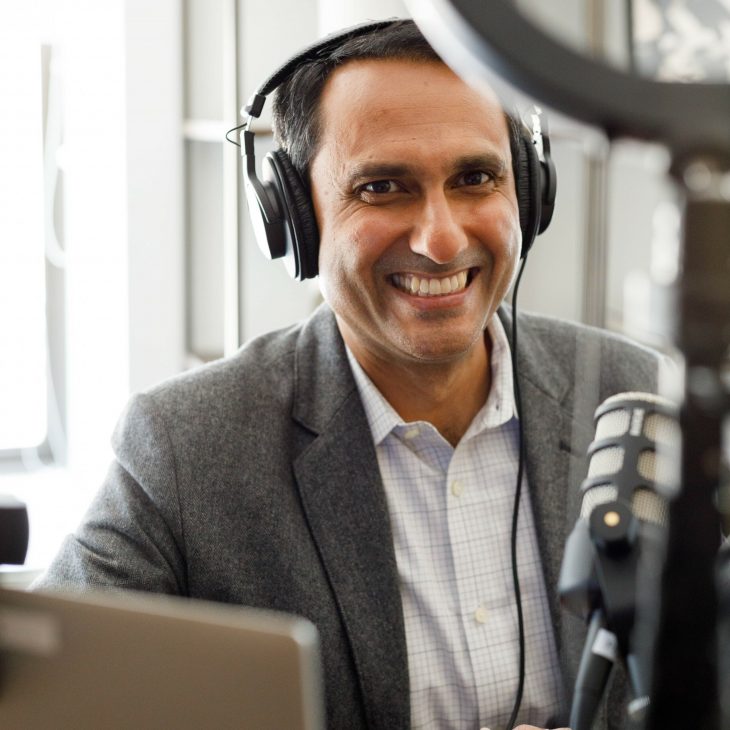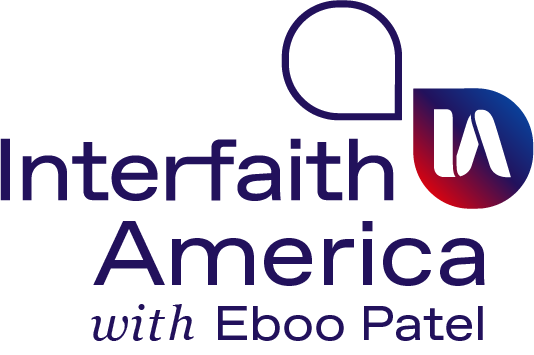Why I’m Launching a Podcast: “Interfaith America with Eboo Patel”
October 13, 2022

My new podcast, “Interfaith America with Eboo Patel,” launched yesterday, Tuesday, October 11. I hope you’ll tune in.
When you do, you’ll hear a series of powerful, inspiring conversations with civic leaders, writers, and educators: people like “On Being” creator Krista Tippett, New York Times columnist David Brooks, religion scholar Laurie Patton, and Pillars Fund founder Kashif Shaikh. Together we’ll explore America’s changing religious landscape and talk about the ways religion can be a bridge of cooperation, not a barrier of division.
I recently sat down with Interfaith America Magazine managing editor Monique Parsons to discuss what inspired me to have these conversations, and why it’s time for Americans to see ourselves as a truly interfaith nation.
Monique Parsons: Why did you decide to launch an Interfaith America podcast?
Eboo Patel: There is a large conversation in the United States about the significance and implications of becoming a majority-minority country when it comes to ethnicity and race. I think that’s hugely important. We are also now the most religiously diverse nation in human history, and we are only going to become more religiously diverse. That has huge implications, and there is much less attention given to the significance and implications of that demographic fact. It’s hugely important because in the United States, religious communities provide a significant amount of our social capital. We’re seeing that everywhere from the groups responding to Hurricane Ian in Florida to the groups that are responding to help migrants settle across our nation.
Another reason is that the United States has always understood itself in religious language: “city on a hill,” “beloved community,” and “almost chosen people.” It has largely been in a Christian language, often a capacious and beautiful Christian language. As our religious demographics change, that language is likely to change as well. Because as the Muslim community grows, as the Hindu, Buddhist, and secular Humanist communities grow, the language that is indigenous to those communities and traditions will find its way into the American imagination. Discussing the contours and the texture of this feels very important for the nation right now.
Our organization, Interfaith America, is celebrating its 20th anniversary. Over that time, I have come to know lots and lots of fascinating people at the intersection of what in Islam is known as “Deen and Dunya,” faith and world. In private conversations, they have shared powerful things with me — Trabian Shorters learning from his grandparents that the spirit world is actually the real world; what Krista Tippett has learned from listening to people in her studio for 20 years of producing “Speaking of Faith” and then “On Being.” I treasure those private conversations, and I wanted to make some of them public.
Parsons: What do you feel is missing in the national conversation about religion in America?
Patel: I think a huge part of what is missing is everyday essential civic cooperation that takes place between people from diverse religious communities. We are so attuned to conflict being in the spotlight, and we too often take for granted the inspiring cooperation. We just expect it to always be there, like how health care is provided, which is almost always people from different religions positively cooperating, from the most urgent and complex heart surgery to the most mundane matter like getting your flu shot. It is almost always some kind of endeavor of interfaith cooperation. And oftentimes, the health care facility is the most religiously diverse place in a community. So if you’re in a VA hospital in a rural part of New York state, that VA hospital is religiously diverse, even if the surrounding county is not.
If people with deep disagreements can cooperate in those ways, the story of that needs to be told. We also need to equip more people to lead in new stories of cooperation. Because too often right now, there’s a sense of the inevitability of conflict between people with fundamental disagreements, and we need to be highlighting the inspiring sacredness of cooperation. It’s not fiction; it’s reality. And we all depend on it.
Right now, Southern Baptists, Mormons and Catholics and Lutherans, Muslims and Jews are doing remarkable, lifesaving work together on the Gulf Coast of Florida, and they’re doing it inspired by their faith, and they’re cooperating to help people, to save lives, to rebuild. I just think that we ought to recognize that, strengthen it, and spread it, and we ought to elevate it to be a central part of our national story.
Parsons: What do you hope listeners will take away from these conversations?
Patel: I hope that listeners are inspired to pay more attention to the interfaith cooperation that’s happening in their own lives and our own communities. Too often we miss that. Understanding that interfaith cooperation can inspire other people to lead similar collaborative efforts in their own communities.
That’s the kind of ground-level hope. There’s also a sky-level hope, which is that as a nation, the country that is already interfaith America in terms of demographics and community level cooperation, starts understanding itself as interfaith America as a national story – that “interfaith America” replaces Judeo-Christian as our self-understanding, and that the idea of being a “potluck nation” replaces melting pot or battlefield as our metaphor for diversity. A healthy diverse democracy requires not just civic cooperation at the experiential level, but the aspiration of cooperation as part of our national idea.
Share
Related Articles
American Civic Life
Eboo Patel and Wajahat Ali: Is “Interfaith America” Even Possible?
American Civic Life
Is This a Time for Bridgebuilding? 5 Leaders in Conversation
Interfaith America Interview

Listen to the podcast!
How does our religious understanding of the world inform the ways we live and work together? Host Eboo Patel speaks with a guest in diverse sections of American civic life.
Listen now


